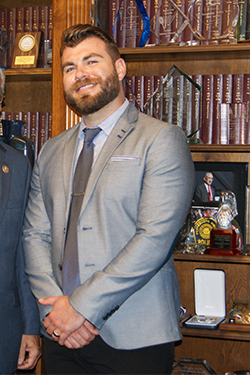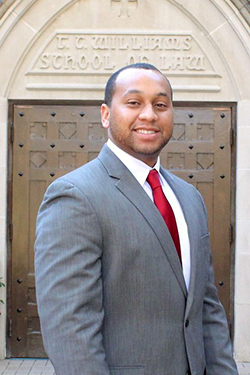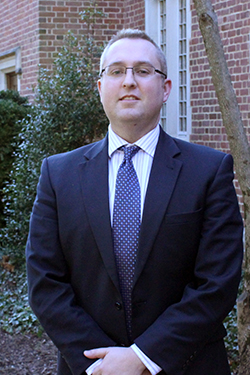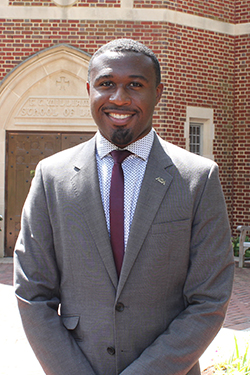Externships give students D.C. experience
For the four students who participated in Richmond Law’s inaugural D.C. Externship program, experience gained was as important as relationships built. “It’s critically important that we establish more ties with Washington, with the opportunities there for our students,” said Steve Allred, university professor and director of the program. And if there was one thing those four students did during their semester in Washington, it was establish ties.
Dillon Taylor, who worked for the House Education and Workforce Committee, summed it up pretty simply: “You just network like crazy.” He put his interest in the intersection of labor and politics to good use, and was able to hit the ground running, preparing hearings, performing research, planning events, and writing memorandums. Amidst the busyness, Taylor estimated that he attended 100 different networking meetings. And the work paid off: He secured one of 10 honors attorneys positions with the Department of Transportation for the 2016-2017 class, a program that regularly receives between 1,700 and 2,000 applicants. The externship “facilitated the ease of the hiring process,” said Taylor (pictured above with Congressman Bobby Scott).
Andy Flavin already had a post-graduate job secured in the environmental and natural resources group of Troutman Sanders. But he wanted to use his externship experience at the Department of Energy to learn more about “energy regulation, get more ‘practical’ experience outside of the classroom, and get a snapshot of life as a federal energy lawyer.” He spent the first half of the semester in the Department of Energy’s Office of Enforcement and the second half in the Office of Litigation. “It was more about learning a different area involving energy, but also kind of evaluating what it’s like to be a lawyer in these different environments,” said Flavin. “You never know what doors are going to open down the road.”
Jonathan Mark spent his time at the Federal Communications Commission in the policy division of the media bureau, which is responsible for the regulation of television and radio stations. The culmination of his work was his appointment to a task force to examine the state of independent programmers. The externship program “makes you competitive on a whole other level,” said Mark. “It’s a great opportunity for students to expand their personal network.” He’ll continue his work at the FCC now that he’s accepted a position in its Attorney Honors Program.
Troy Jenkins used his externship at the Securities Exchange Commission in the Office of the Investor Advocate, an office whose primary function is to provide a voice for investors. Jenkins worked on the policy side of the office, helping prepare a report and drafting comment letters. “Meeting and expanding my network was one of the biggest benefits of the program as a whole,” said Jenkins. “I can’t stress enough how important the hands-on practical experience really is,” he added.
That practical experience was supplemented by a weekly seminar class, led by Allred, in which students would discuss “real issues that real lawyers face,” explained Jenkins. The challenge of such a course is that the students were all practicing in different areas of law. “You have to pick topics that are of interest and value to students irrespective of the placements in which they work,” said Allred. So the class would delve into topics of universal importance in the workplace: conflicts of interest, ethics, bias, and free speech. Students would record their experiences in weekly journal entries. The course “helped you troubleshoot some of the issues that might arise during your externship,” said Mark.
Allred doesn’t anticipate making many tweaks to the program as it moves forward for its second semester, in fall 2016. It will continue to remain small—limited to five to 10 students—and be exclusively for third-year students in the fall semester. “I expect that we’ll get better and better at career placement as we open up new pathways,” said Allred. And for students who are interested in public law and up for the challenge of a non-traditional experience that is “very deep and very demanding,” the externship program may be a good fit.




(Left to right: Dillon Taylor, Troy Jenkins, Andy Flavin, Jonathan Mark)
The Process for Prospective Students
When it comes to prospective applicants for the D.C. Externship program, students partner with Steve Allred, director of the program, and the Career Development Office.
- Step One: The student meets with Professor Allred to discuss his or her interests, background, and plans.
- Step Two: Students who are interested in continuing in the program will meet with Valerie l’Herrou in the Career Development Office to explore potential externship possibilities in Washington D.C.
- Step Three: The student is responsible for reaching out to the agencies to apply for and secure a position. “We help the student, we facilitate the process, we make the contacts—but there’s a significant responsibility on the student,” said Allred.
The program is open to 3L students in the fall semester. Questions? Please contact Prof. Allred at sallred@richmond.edu.
